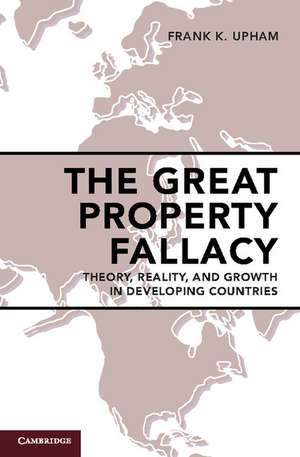The Great Property Fallacy: Theory, Reality, and Growth in Developing Countries
Autor Frank K. Uphamen Limba Engleză Paperback – 24 ian 2018
| Toate formatele și edițiile | Preț | Express |
|---|---|---|
| Paperback (1) | 216.31 lei 39-44 zile | |
| Cambridge University Press – 24 ian 2018 | 216.31 lei 39-44 zile | |
| Hardback (1) | 475.92 lei 6-8 săpt. | |
| Cambridge University Press – 31 ian 2018 | 475.92 lei 6-8 săpt. |
Preț: 216.31 lei
Nou
Puncte Express: 324
Preț estimativ în valută:
41.39€ • 44.26$ • 34.51£
41.39€ • 44.26$ • 34.51£
Carte tipărită la comandă
Livrare economică 14-19 aprilie
Preluare comenzi: 021 569.72.76
Specificații
ISBN-13: 9781108436946
ISBN-10: 1108436943
Pagini: 160
Dimensiuni: 152 x 228 x 10 mm
Greutate: 0.24 kg
Editura: Cambridge University Press
Colecția Cambridge University Press
Locul publicării:New York, United States
ISBN-10: 1108436943
Pagini: 160
Dimensiuni: 152 x 228 x 10 mm
Greutate: 0.24 kg
Editura: Cambridge University Press
Colecția Cambridge University Press
Locul publicării:New York, United States
Cuprins
1. Introduction; 2. Physics envy: property rights in development theory; 3. Property and markets: England and America; 4. Property and politics: Japan; 5. Law and development without the law part: China; 6. Theory in action: Cambodia; 7. Property rights and social change.
Recenzii
'Is it possible that the widely held belief in well-enforced property rights as essential for economic flourishing is not only unfounded but also potentially dangerous? Drawing on studies of five countries, Frank K. Upham mounts an impressive challenge against a seldom-questioned pillar of development theory. The Great Property Fallacy is a great read, and will cause many to rethink the relation between property law and development.' Mary Ann Glendon, Learned Hand Professor of Law, Harvard University, Massachusetts
'In this unprecedented comparative and historical treatise, Frank K. Upham integrates case studies across time and space and provides a coherent, persuasive theory highlighting the destruction of property rights in rapidly changing societies. In a clear, concise manner, The Great Property Fallacy reveals the complexity and contingency of property rights and ushers in a new era of understanding property rights in development. It will serve as a foundational work for years to come.' Shitong Qiao, The University of Hong Kong
'Frank K. Upham's book provides a critical, compelling evaluation of the conventional wisdom among many law-and-development scholars and aid-and-development agencies: namely, that formalization of private property rights, especially to land, enforced by a strong, competent, and politically independent judiciary, is an indispensable element in effective growth strategies for developing countries. Through highly illuminating case studies from both developed and developing countries (including China), Upham challenges this conventional wisdom by showing that property rights regimes are highly context-specific and idiosyncratic, and that no single model is a precondition for economic development.' Michael Trebilcock, University of Toronto
'Frank Upham's book, written by a law professor and sometime World Bank consultant, is … a passionate, personal cri de coeur based on the author's own observations about the missteps committed by those who seek to advance economic development by advancing property rights.' José E. Alvarez, American Journal of International Law
'… impressed … focuses instead on whether formal property rights contribute to economic development. The lesson of The Great Property Fallacy is that development is not easy to come by - nations often fail, and even those that have succeeded do not necessarily know what they did right.' Yun-chien Chang, Law & Social Inquiry
'In this unprecedented comparative and historical treatise, Frank K. Upham integrates case studies across time and space and provides a coherent, persuasive theory highlighting the destruction of property rights in rapidly changing societies. In a clear, concise manner, The Great Property Fallacy reveals the complexity and contingency of property rights and ushers in a new era of understanding property rights in development. It will serve as a foundational work for years to come.' Shitong Qiao, The University of Hong Kong
'Frank K. Upham's book provides a critical, compelling evaluation of the conventional wisdom among many law-and-development scholars and aid-and-development agencies: namely, that formalization of private property rights, especially to land, enforced by a strong, competent, and politically independent judiciary, is an indispensable element in effective growth strategies for developing countries. Through highly illuminating case studies from both developed and developing countries (including China), Upham challenges this conventional wisdom by showing that property rights regimes are highly context-specific and idiosyncratic, and that no single model is a precondition for economic development.' Michael Trebilcock, University of Toronto
'Frank Upham's book, written by a law professor and sometime World Bank consultant, is … a passionate, personal cri de coeur based on the author's own observations about the missteps committed by those who seek to advance economic development by advancing property rights.' José E. Alvarez, American Journal of International Law
'… impressed … focuses instead on whether formal property rights contribute to economic development. The lesson of The Great Property Fallacy is that development is not easy to come by - nations often fail, and even those that have succeeded do not necessarily know what they did right.' Yun-chien Chang, Law & Social Inquiry
Notă biografică
Descriere
Explains the role of property law in growth and development over five centuries and across several different countries and cultures.
